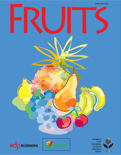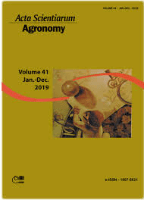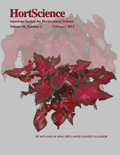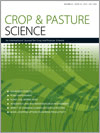
AMERICAN JOURNAL OF POTATO RESEARCH
Scope & Guideline
Pioneering Insights for Potato Cultivation and Management
Introduction
Aims and Scopes
- Potato Breeding and Genetics:
Research in this area emphasizes the development of new potato varieties with desirable traits such as disease resistance, yield stability, and quality characteristics. Studies often utilize genetic mapping and marker-assisted selection. - Agronomic Practices and Crop Management:
This scope includes investigations into best practices for potato cultivation, including irrigation management, soil health, and tillage methods. The focus is on enhancing productivity and sustainability of potato farming. - Plant Pathology and Disease Management:
Research addressing the identification, management, and resistance of potatoes to various pathogens and pests. This includes studies on viral, fungal, and bacterial diseases affecting potato crops. - Nutritional and Quality Assessment:
This area explores the nutritional value of potatoes and the impact of various cultivation practices and varieties on tuber quality, including flavor, texture, and health benefits. - Innovative Technologies in Potato Research:
The journal publishes studies employing cutting-edge technologies such as UAV imaging, remote sensing, and molecular techniques to improve potato research and farming practices. - Environmental and Soil Science:
Research focusing on the interactions between potato cultivation and environmental factors, including studies on soil health, nutrient management, and the impact of climate change on potato production.
Trending and Emerging
- Climate Resilience and Stress Adaptation:
Research focusing on the adaptation of potato varieties to climate stresses, such as heat and drought, is gaining traction. This reflects the need for crops that can withstand changing environmental conditions. - Molecular Breeding Techniques:
There is an emerging trend in the use of molecular techniques, such as genome-wide association studies (GWAS) and CRISPR technology, to enhance breeding efforts and develop genetically superior potato varieties. - Sustainable Farming Practices:
The journal is increasingly featuring studies on sustainable agricultural practices, including organic farming, soil health management, and the use of natural amendments to improve potato production. - Technological Innovations in Crop Monitoring:
The application of remote sensing, UAV technology, and precision agriculture techniques is trending. These innovations are being used to monitor crop health, optimize inputs, and predict yields. - Nutritional Enhancement and Functional Foods:
Research that investigates the nutritional enhancement of potatoes and their potential as functional foods is on the rise, emphasizing health benefits and food security.
Declining or Waning
- Traditional Pest Control Methods:
Research on conventional pest control methods appears to be waning, as there is a growing emphasis on integrated pest management (IPM) and biological control strategies that are more sustainable. - General Reviews of Potato Cultivation:
There is a noticeable decline in publications focusing solely on general reviews of potato cultivation practices, as recent studies tend to be more specialized and data-driven, focusing on specific problems or innovations. - Historical Cultivar Assessments:
Studies focused on historical assessments of potato cultivars are becoming less frequent, likely due to the increased interest in developing new varieties and leveraging modern genetic tools.
Similar Journals

Revista de la Facultad de Agronomia de la Universidad del Zulia
Empowering Scholars: A Platform for Agronomic ExcellenceWelcome to the Revista de la Facultad de Agronomia de la Universidad del Zulia, a key publication in the fields of Agronomy, Animal Science, Food Science, and Plant Science. Published by the Facultad de Agronomía, Universidad del Zulia, this journal aims to foster academic dialogue and disseminate impactful research that advances knowledge and practice within these disciplines. Operating under the ISSN 0378-7818 and E-ISSN 2477-9407, this journal offers a platform for both emerging and established scholars to share their discoveries and innovations. Despite its challenges, as reflected in its Q4 ranking across multiple categories in 2023, it remains a vital resource for the Venezuelan scientific community and beyond. Readers will benefit from a diverse array of studies and discussions that address contemporary issues in agriculture and related fields, helping inform best practices and policy. Engage with cutting-edge research from Venezuela and contribute to the development of agronomic sciences in the region.

Egyptian Journal of Agronomy
Driving Change in Agronomy and BeyondEgyptian Journal of Agronomy, published by the NATL INFORMATION DOCUMENTATION CENT, ACAD SCIENTIFIC RESEARCH & TECHNOLOGY, serves as a pivotal platform for researchers, professionals, and students focusing on various disciplines within the agricultural sciences, including agronomy, soil science, horticulture, and ecology. With an ISSN of 0379-3575 and E-ISSN of 2357-0288, the journal aims to bridge the gap in knowledge and innovation in the field with its comprehensive studies and frameworks. While the journal is currently categorized in low Scopus ranks, indicating immense potential for growth in influence and impact, it remains dedicated to providing quality research and fostering advancements in agronomic practices. Set in Egypt, a hub for agricultural research, the journal is committed to reflecting the regional and global challenges in agriculture. The Egyptian Journal of Agronomy is a vital resource for anyone engaged in the evolving landscape of agricultural science, offering insights that promote sustainable practices and address current issues facing the sector.

Fruits
Cultivating Knowledge, Harvesting Innovation.Fruits, published by the International Society for Horticultural Science (ISHS), is a pivotal journal in the fields of Agronomy, Food Science, and Horticulture. Since its inception in 1995 and with a continued publication from 2001 to 2024, this journal provides a platform for innovative research and advancements related to fruit science, covering an array of topics from cultivation techniques to post-harvest processing. With an ISSN number of 0248-1294 and an E-ISSN of 1625-967X, *Fruits* engages a global audience, operating out of France and serving as a vital resource for academics, industry professionals, and students alike. Despite its current categorization as Q4 in Agronomy and Crop Science and Q3 in both Food Science and Horticulture, the journal is committed to fostering high-quality research and enhancing its visibility within the academia, as reflected in its Scopus rankings. Readers can expect rigorous peer-reviewed articles that contribute significantly to the understanding of fruit-related science, ultimately driving the advancement of sustainable practices in the field. Emphasizing accessibility, while currently not open access, *Fruits* remains dedicated to disseminating valuable knowledge to enhance the communal pursuit of excellence in horticultural research.

ACTA SCIENTIARUM-AGRONOMY
Shaping the future of agronomy with impactful research.ACTA SCIENTIARUM-AGRONOMY is a prestigious, peer-reviewed journal published by UNIV ESTADUAL MARINGA, PRO-REITORIA PESQUISA POS-GRADUACAO, focusing on advanced research in the field of agronomy and crop science. Since its inception as an Open Access journal in 2007, it has significantly contributed to disseminating high-quality research, allowing unrestricted access to its content for a global audience. Operating from Brazil, the journal holds a notable Q2 category ranking in Agronomy and Crop Science as of 2023, validating its importance within the academic community. The journal’s Scopus ranking positions it in the 49th percentile among Agricultural and Biological Sciences, indicating a robust foundation for impactful research. With a commitment to innovation and scientific excellence, ACTA SCIENTIARUM-AGRONOMY aims to provide researchers, professionals, and students with vital insights that drive forward our understanding of agriculture and its environmental implications.

HORTSCIENCE
Nurturing the growth of horticultural excellence.HORTSCIENCE is a prestigious journal published by the American Society for Horticultural Science, focusing on the latest research and developments in the field of horticulture. With an ISSN of 0018-5345 and an E-ISSN of 2327-9834, this journal has established itself as a vital resource for horticultural scientists, practitioners, and educators since its inception. As of 2020, it has embraced an Open Access model, promoting the dissemination of scientific knowledge and enabling wider accessibility to its rich content. HORTSCIENCE currently holds a Q2 ranking in the Horticulture category for 2023, placing it in the top tier of its field with a Scopus rank of 36 out of 115 in the area of Agricultural and Biological Sciences. This journal publishes empirical research, significant advancements, and comprehensive reviews that contribute to the understanding and improvement of horticultural practices, making it an essential publication for anyone involved in horticultural research or education.

Pesquisa Agropecuaria Tropical
Empowering innovation in agronomy and crop science.pesquisa Agropecuaria Tropical is a premier Open Access journal dedicated to advancing the knowledge and practices within the field of agronomy and crop science. Since its inception in 1971, this peer-reviewed journal, published by the Universidade Federal de Goiás, has played a pivotal role in disseminating high-quality research from Brazil and beyond. Operating under an Open Access model, it ensures that scholarly articles are freely accessible, thereby fostering greater collaboration and innovation. With a Scopus ranking placing it in the 32nd percentile among its peers in agricultural and biological sciences, and a current classification in the Q3 category of agronomy and crop science, the journal serves as an essential resource for researchers, professionals, and students alike. As it continues its publication journey from 2010 to 2024, it remains committed to contributing valuable insights and advancements in the agricultural sector, ultimately influencing sustainable practices and food security.

POTATO RESEARCH
Connecting research to sustainable potato production.POTATO RESEARCH is a prestigious journal dedicated to advancing the scientific understanding of potato cultivation and its wider implications in the fields of agronomy, crop science, and food science. Published by Springer in the Netherlands, this journal boasts an impressive impact factor and ranks in the Q2 category for both Agronomy and Crop Science, as well as Food Science in 2023, affirming its significant contribution to these disciplines. With over five decades of research converged from 1970 to 2024, POTATO RESEARCH serves as a vital platform for researchers, professionals, and students interested in the latest findings and innovations that affect potato production and processing. Although it is not an open-access journal, it remains a crucial resource for those dedicated to enhancing agricultural sustainability and food security. For inquiries or submission details, please refer to their office located at Van Godewijckstraat 30, 3311 GZ Dordrecht, Netherlands.

CROP SCIENCE
Fostering breakthroughs in crop production and genetics.CROP SCIENCE, published by WILEY, is a premier journal dedicated to the field of agronomy and crop science, offering a platform for high-quality research on crop production, genetics, and sustainable agricultural practices. With an impactful presence since its inception in 1974, the journal has become a significant contributor to advancing knowledge in this critical field, as evidenced by its Q2 ranking in the 2023 categorizations and a Scopus rank in the 72nd percentile among its peers. The journal's aim is to disseminate innovative research findings that inform best practices and policies for enhancing crop yield and sustainability, making it an essential resource for researchers, professionals, and students alike. Although CROP SCIENCE does not currently offer open access options, the journal’s extensive readership and reputation make it a valuable asset for anyone invested in the future of agriculture.

VITIS
Fostering Excellence in Viticultural ResearchVITIS is a distinguished journal published by the Julius Kuhn Institute (JKI), based in Germany, dedicated to advancing the field of viticulture and enology. With a long-standing history dating back to 1981, VITIS serves as a vital platform for researchers, professionals, and students alike, focusing on critical insights and innovations related to vine genetics, cultivation, and grape quality. Although the journal operates under a traditional access model, its commitment to publishing high-quality, peer-reviewed research contributes to its relevance, as indicated by its current rankings of Q4 in Genetics and Q3 in Horticulture for 2023. Furthermore, with its Scopus rankings placing it within the agricultural and biological sciences community, VITIS plays an essential role in disseminating vital knowledge to enhance viticultural practices. Researchers and practitioners are encouraged to explore the breadth of studies published, contributing to the ongoing dialogue in horticulture and plant genetics.

Crop & Pasture Science
Connecting global minds in crop and pasture science.Crop & Pasture Science is a leading journal published by CSIRO PUBLISHING, focusing on the critical fields of agronomy, crop science, and plant science. With an impressive Q2 ranking in both categories as of 2023, this journal plays a vital role in disseminating high-quality research that addresses the challenges in sustainable agriculture and food security. Featuring full open-access options, Crop & Pasture Science ensures your research reaches a wide audience, fostering collaboration and innovation among ecologists, agronomists, and plant scientists. With a steady record of contributions since its establishment and a convergence of knowledge from 2009 to 2024, this journal stands at the forefront of the agricultural sciences, providing a robust platform for the latest advancements and discoveries. Located in Australia, the journal serves a global community, making it an essential resource for anyone invested in the future of agriculture and environmental sustainability.